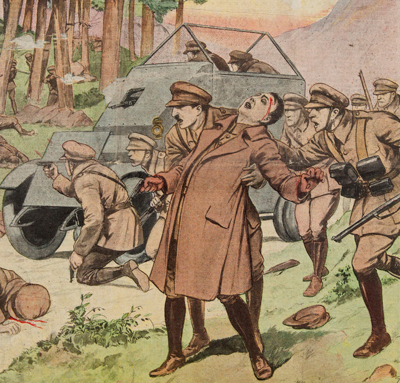Michael Collins slain in west Cork ambush
Béal na Bláth, 26 August 1922 – Michael Collins, TD, Chairman of the Provisional Government and Commander-in-Chief of the National Army, has been killed in an ambush in west Cork. The ambush by Irregular troops occurred on 22 August at Béal na Bláth, a stretch of road between Macroom and Bandon.
According to a statement issued by the army the ambush led to an hour-long conflict between Free State and anti-treaty troops which ended with the commander-in-chief fatally wounded. His body was removed from the scene to Shanakiel Hospital in Cork.
News of the ambush and the fatal shooting was brought to wider public attention by a special early edition of the Evening Echo newspaper. The official account claims that General Collins ‘fought throughout the action’ and set a ‘splendid example to his men’, continuing to fire from the ground ‘until his strength failed, and he collapsed.’ He died within minutes.
The Cork Examiner is reporting that the Commander-in-Chief’s dying words as he lay on the roadside were: ‘Forgive them.’
Collins had been visiting various military posts in the south-western command with Commandant Sean O’Connell, the officer commanding the bodyguard; Major-General Emmet Dalton, commander of the troops in Cork; and Lt Commandant Dolan. He had been travelling in an open touring car, which was supported by an armoured car and accompanied by national troops in a tender.
The group was sticking to the by-roads of the region owing to reports that some of the main roads had been blocked. The route was wild and rugged and situated amongst hills with poor roads.
A despatch rider travelling on a motorcycle in advance of Mr Collins and his comrades was the only other member of the national forces injured in the exchanges.
It is believed that the fatal shot that killed Mr Collins came towards the end of the hour-long exchange, when the firing had become less intense and when the irregular troops were on the point of retreating from their positions.
Pathé newsreel footage of the late General Michael Collins who was killed in an ambush in County Cork
A statement addressed to the people of Ireland from the Irish government’s publicity department has declared that the ‘genius and courage of Michael Collins lent a force and an inspiration to the race which brought the long fight against the external enemy to the triumphant end which had become almost a dream, and swept before it the domestic revolt which tried to pluck from your hands the fruits of that triumph – your unchallenged authority in the land.’
‘In every phase of the awakened activity of the nation, constructive, administrative, executive, military, the personality of Michael Collins was vivid and impelling.’
‘He has been slain, to our unutterable grief and loss, but he cannot die. He will live in the rule of the people which he gave his great best to assert and confirm, and which his colleagues undertake as a solemn charge to maintain.’
The government has declared that 28 August will be a day of mourning in Dublin. All work and other essential services will cease. In other parts of the country, business is to be suspended between the hours of 11 am and noon and masses for the repose of the soul of the late General Collins will be celebrated at 11am.

The late Michael Collins pictured at the funeral of Arthur Griffith, alongside his successor (on his left) General Mulcahy with GHQ staff (Image: Irish Life, September 1922)
[Editor's note: This is an article from Century Ireland, a fortnightly online newspaper, written from the perspective of a journalist 100 years ago, based on news reports of the time.]





















